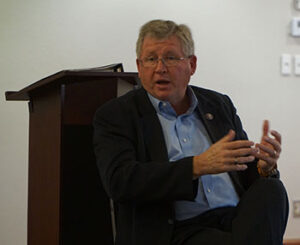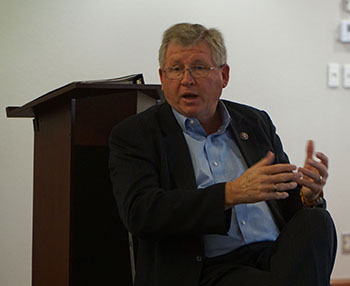By Jordan Green, Editor-in-Chief
Congressman says
Republican control likely to return
to U.S. House
The future of American agricultural policy will depend heavily on which political party controls Congress next year, Oklahoma Rep. Frank Lucas said in a town hall meeting on campus Oct. 27.
“If [Democrats] are still the majority, I think you get a dramatic reroute of the farm bill with a keen focus on making sure that production agriculture is conducted in a certain way — somebody’s definition of ‘environmentally friendly’ — and that resources will be driven to achieve social justice,” Lucas said. “I’m always concerned.”
Lucas, R-Cheyenne, made those remarks and more during the forum. Alva was one of several publicized stops the congressman has made across the expansive third congressional district ahead of the Tuesday midterm elections. His office will be on the ballot.
Lucas, heavily favored to win reelection, will face political newcomer Democrat Jeremiah Ross.
DEMOCRATS FOCUS ON SOCIAL JUSTICE IN AG
A farmer and rancher in Roger Mills County in western Oklahoma, Lucas said Republicans and Democrats have diverging interests for agricultural policy heading into 2023. However, he expects Republicans to become the majority party following Tuesday’s election.
Congress will discuss the farm bill, an assortment of legislation dealing with multiple facets of agricultural production and trade, next year.
While Republicans aim to keep agricultural policy largely in line with that of the last decade, Democrats are pushing for increased financial assistance for minority farmers and additional regulations regarding climate change, Lucas said.

The debate surrounding agricultural policy comes as farmers and ranchers across the nation face extreme drought conditions and record-setting cost increases. Crop insurance, which allows producers to recover money invested in planting crops that become damaged, will be a chief topic in next year’s farm bill if Republicans are leading the effort, Lucas said.
“Because of way crop insurance works now, you have so many bad years, and it begins to affect the safety net, the value of the disaster,” Lucas said. “So, we have to look at the farm bill about, ‘If this is a one-year anomaly, OK. If this is another multi-year farm bill, how do you make sure crop insurance really still is a safety net? That takes money, and we’ll work our way through that.”
‘DRAMATICALLY
OFF COURSE’
If Democrats keep control of the House, however, representatives with little agricultural experience could shift policy discussions more toward hot-button issues, Lucas said.
David Scott, a Democrat from Atlanta, Georgia, would likely lead the House committee on agriculture and favor policies that forgive minority farmers’ debt and impose further regulations on emissions.
“Farm bills have been about resources following production to guarantee a steady, consistent, safe, affordable supply of food and fiber,” Lucas said. “But if you use farm bills to determine who can farm, and what they can farm, that takes us dramatically off the course we’ve been on since 1933.
“On forgiving minority farmers’ loans, I think I understand where they’re coming from, but that’s not fair. You can have just as hard a time starting out in farming and staying in farming if you were a non-minority.”
Lucas also discussed the meat-packing industry, which has been a source of contention among producers who say the industry’s monopolistic practices hurt producers and pass along unfair prices to Americans.
The U.S. Department of Justice is investigating the industry to look for potential criminal actions, but Congress hasn’t been able to obtain much information about it, Lucas said.
He highlighted several other topics during the discussion, which a handful of university administrators and community members attended.
STUDENT DEBT RELIEF
ON HOLD
President Joe Biden’s controversial executive order to reduce student debt is held up in the court system, Lucas said.
“It’s a controversial program,” Lucas said. “I worry that it is creating a break in society because I’ve had more than one person say, ‘I went to work at 18 or 20. I work every day, trying to get my kids into CareerTech or community college or four-year comprehensive, and I’m supposed to pay for somebody else’s education?’”
Several cases challenging Biden’s order have been filed in courts across the country, though most have been dismissed. Despite the idea’s unpopularity among conservatives, Lucas said he would encourage his eligible constituents to sign up for it if the program is upheld.
TRUMP 2024?
As for the 2024 presidential election, Lucas said he doesn’t believe President Joe Biden will be on the ballot again. He also doesn’t see Vice President Kamala Harris “stepping into that role.”
“Biden is showing a lot of wear and tear,” Lucas said. “If he decides not to run, that shakes up the Democratic Party nomination.”
As for former President Trump, who may or may not run again, Lucas said: “Trump is not the kind of guy who is going to lose twice in one lifetime.”

